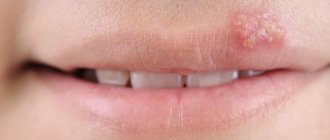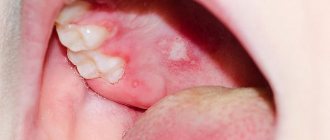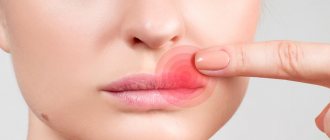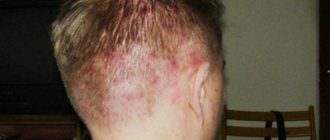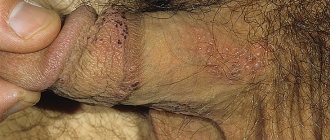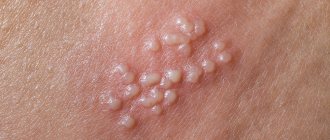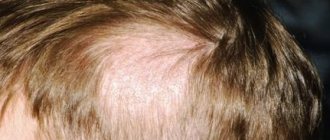Concept
Herpes is viral in nature and manifests itself in the form of water-filled blisters on the epidermis. Most often, herpes affects the lips and cheeks. Less commonly appears on the arms, back or genitals. The scalp is the least affected part. There are 7 known varieties of the herpes virus. Two of them can cause herpes capitis.
Risk groups for infection:
- People who have reached the age of 60–65 years. Women get sick more often, which is explained by hormonal changes in the female body (menopause, menopause).
- People with impaired protective functions of the body. These are HIV-infected people suffering from AIDS and autoimmune diseases. This form of the disease can be found even in a frequently ill child with serious health problems.
Causes
Herpes scalp can appear for two reasons:
- Infection through direct contact with a patient with an active form. Occurs through close contact with the hair of an infected person (using one comb). The greatest danger of infection is at stage 3 of the disease, when the blisters with their contents burst.
- Recurrence of chickenpox suffered in childhood.
Important! If it comes into contact with damaged areas of the skin (scratches, wounds, abrasions), the contents of herpetic vesicles can lead to infection of a healthy person.
Circumstances that contribute to the reactivation of the virus are:
- poor environmental conditions;
- bad habits;
- decreased protective function of the body;
- sedentary lifestyle, lack of physical activity;
- hypothermia or overheating;
- constant presence of the body in a stressful situation;
- weakening of the body after surgery.
2 of 7 viruses can cause herpes capitis:
- Type 1 virus. Infection occurs by airborne droplets. Most often it causes herpes on the lip, but there are cases where rashes appeared on the head. In this case, the virus affects the body only in the presence of microtraumas of the scalp. That is, for infection the patient must touch the affected area on the lip. Then to a wound or scratch on the scalp. Moreover, such a situation will not occur with good immunity.
- Virus type 3 (Varicella-Zoster virus). This is the causative agent of chickenpox. Having had it in childhood, the virus remains in the body in an inactive form.
Stages and symptoms
The pathology occurs in 4 stages, each of which corresponds to certain symptoms:
- Initially, the scalp begins to itch, tingle, and painful sensations appear. Later the scalp turns red. The general condition of the patient is similar to the onset of a cold; the temperature may be elevated. Possible headache.
- After 12 hours, acute inflammation of the scalp begins. Bubbles filled with liquid (vesicles) appear, and over time the number of rashes steadily increases.
- The vesicles burst. The pain subsides.
- In place of the blisters, scabs form, which fall off on their own after a few days. This symptom indicates recovery.
After a month of the disease, the pathological process subsides. But if the patient’s immunity is weak, painful sensations along the affected nerves can persist for 1–2 months.
Symptoms
Herpes, which affects the scalp, can manifest itself as a single symptom. However, more often there is a whole set of symptoms that are difficult to get rid of.
The activity of the virus is manifested:
- itching and burning;
- the formation of ulcers on the back of the head and temples;
- significant increase in temperature;
- headache .
Which doctor treats herpes
Herpes is a contagious disease of viral etiology, manifesting itself in the form of painful blistering rashes of various locations.
The pathology is accompanied by swelling of the lymph nodes, nausea, due to which appetite disappears, and loss of strength. Each of the four stages manifests itself differently:
- The first stage begins with tingling and redness of the skin.
- In the second, the head becomes covered with a rash in the form of small blisters that fill with liquid and cause discomfort.
- At the third stage, the formations are opened. In their place, wounds remain into which harmful microorganisms easily penetrate and, upon contact, can travel to a healthy person.
- At the last stage, the blisters turn into brown scabs
Usually, the discomfort of herpes goes away within two weeks or a month. If a person’s body’s defenses are weakened, painful symptoms will make themselves felt for several more years.
When the pathology is advanced, the infection spreads throughout the body and penetrates the cells of the nerve plexuses. Herpes can disrupt the functioning of even the entire system, leading to loss of sensitivity in the affected area.
Why can our articles be trusted?
We make health information clear, accessible and relevant.
- All articles are checked by practicing doctors.
- We take scientific literature and the latest research as a basis.
- We publish detailed articles that answer all questions.
The most dangerous form of herpes zoster is meningoencephalitis, when the pathogen damages the brain and affects the psyche. The patient suffers from hallucinations and has problems with coordination. This type of pathology sometimes ends in death.
The necrotic form of herpes zoster is characterized by the appearance of long-term non-healing ulcers at the site of the rash.
Diagnostics
Detection of the virus in a medical facility is carried out in the following ways:
- Assessment of external signs and questioning of the patient.
- PCR analysis. The result of this test identifies the specific type of herpes virus. The study requires biological material from the patient. The contents of the blisters are taken for examination.
- Hybridization method. The goal is to determine the genome of herpes in cells.
- Linked immunosorbent assay. Detects the presence of antibodies to the virus.
Drug treatment
Therapy for herpes scalp is aimed at reducing the symptoms that accompany the course of the disease and fighting the virus. For this purpose, they most often use:
- Taking antipyretic drugs. These are drugs with paracetamol and ibuprofen that have an analgesic effect.
- Taking antiviral drugs - Vacyclovir, Acyclovir. The drugs are low toxic and have a selective effect. Taken orally in the form of tablets, used locally as an ointment.
- Treatment of affected areas with antiviral ointment - Gerpevir, Zovirax.
- At the stage when the bubbles with liquid burst, it is necessary to disinfect these areas. To do this, use hydrogen peroxide, then dry it with brilliant green. To speed up healing, treat with Streptocide or Panthenol.
- If crusts form at the site of the blisters, Erythromycin ointment will ensure speedy healing.
- For severe pain, you can apply pain-relieving patches and ointments based on lidocoine. It has a strong anesthetic effect and can relieve pain for 12 hours.
- Physiotherapy - ultraviolet light, quartz treatment - are effective in destroying the virus.
- For complex therapy, vitamin and mineral complexes and immunomodulators should be taken. This will help restore the body's weakened immunity.
Attention! If you have herpes on the scalp, it is not recommended to wash your hair frequently to avoid infection of healthy areas. For hair hygiene, it is better to use shampoos with a natural base, with a normal Ph level.
Treatment
Herpes affects not only the skin, but also affects the nerve endings, so the patient needs to see both a dermatologist and a neurologist. You definitely need to visit an infectious disease specialist.
Self-medication is dangerous with complications!
Attention
Despite the fact that our articles are based on trusted sources and have been tested by practicing doctors, the same symptoms can be signs of different diseases, and the disease may not proceed according to the textbook.
Pros of seeing a doctor:
- Only a specialist will prescribe suitable medications.
- Recovery will be easier and faster.
- The doctor will monitor the course of the disease and help avoid complications.
find a doctor
Do not try to treat yourself - consult a specialist.
It is not possible to remove the causative agent of herpes zoster from the body. The specialist prescribes medications that reduce painful symptoms, promote healing of ulcers and wounds, and prevent the pathological process from spreading.
At the initial stage of herpes zoster infection, within five days you can stop the activation and multiplication of the virus. It takes three times longer to fight an advanced form of herpes.
Inhibit the activity of the pathogen using antiviral drugs. The components that are present in the drug destroy the DNA of harmful microorganisms.
Treatment of herpes
Skin herpes in adults develops mainly due to infection of the body with a type 1 virus.
To reduce itching and relieve swelling, the affected areas are lubricated with creams. At the most severe stage of development of herpes zoster, when scabs take the place of the blisters, an antibiotic-based ointment is applied to the skin.
Since the herpes virus is activated when problems arise with the body's protective functions, medications are needed that restore immunity.
Preparations that contain nucleic acids accelerate the healing of wounds that form with herpes zoster. The treatment regimen for pathology includes the use of vitamins of different groups.
Antiviral medications eliminate inflammation and prevent new blisters from forming.
To quickly get rid of herpes on the head, they resort to physiotherapy. The best result is achieved by irradiating the skin with a laser, a quartz lamp, or after using ultraviolet radiation.
Strict adherence to hygiene speeds up the treatment of herpes zoster. However, you should not wash your hair often. Instead of shampoos and conditioners with additives, you need to use detergents that are intended for children.
Virus danger
Due to the similarity of the primary symptoms with a cold, the disease progresses and treatment does not begin. Seeking qualified help is observed only when obvious signs appear - rashes.
A prompt visit to a doctor will allow you to get rid of the disease within 5 days to a week. If you delay contacting a medical facility, treatment will take up to 2 weeks. To diagnose and treat herpes of the scalp, you should contact a therapist, dermatologist, or neurologist. You should seek help if you have the following symptoms:
- feeling of itching and burning on the head;
- headache and fever;
- weakness, apathy for food, nausea;
- inflammation of the lymph nodes;
- the appearance of even small ulcers on the back of the head and temples (they can merge into a single whole).
It is not recommended to postpone a visit to the doctor, since the pathology is potentially dangerous for other organs and systems. This can lead to the following complications:
- Localization of the virus on the scalp is dangerous due to its proximity to the brain. If it enters the brain, it causes menengoencephalitis.
- The virus can lead to pneumonia.
- If the virus spreads to the ears or eyes, the patient may become blind or deaf.
- Herpes of the head can lead to radiculitis, infertility, liver damage, and other chronic pathologies.
- Pathology often leads to complications in the form of severe headaches.
- The virus embeds itself in nerve endings. When an entire nerve becomes inflamed, facial muscles may become paralyzed or their motor activity may be impaired.
What is herpes on the head
Children who have had chickenpox usually develop immunity to the virus, but it does not leave the body, but finds a place in the nerve ganglia. When the protective forces are weakened, the herpes pathogen begins to act, provoking the development of the pathological process.
A herpetic rash on the scalp is usually a manifestation of chickenpox.
Itchy red blisters appear on the scalp that leave crusts; characterized by fever and poor health.
Diagnostics: examination, PCR, ELISA, culture isolation.
Treatment: antiseptics and antiviral ointments; general antiviral, antihistamine, immunomodulators; Physiotherapy UFO.
Bubbles form on the forehead and scalp; when they open, the liquid upon contact is transferred to a crack or microtrauma that is located on the skin of a healthy person.
A rash on the head, accompanied by unbearable itching, is formed if the virus is activated in the trigeminal nerve, which is located on top of the visual organ or near the ear.
Prevention
Measures to prevent infection with the disease are aimed at strengthening the immune system and overall health. To achieve these goals, you must adhere to the following rules:
- Complete and balanced nutrition. Be sure to eat food that is steamed, boiled or in the oven. Eat vegetables and fruits, fresh fish and lean meats.
- Elimination of bad habits.
- Avoiding the use of common household items when visiting public places (baths, saunas, swimming pools, etc.).
- Maintaining a physically active lifestyle, walking in the fresh air, swimming, exercise.
The danger of scalp herpes lies in the risk of the virus infecting important organs and systems of the human body. This can lead to chronic illness, even loss of important life functions. Infection with a virus or activation of a virus already present inside the body occurs due to reduced immunity. Therefore, in order to avoid infection and relapse of the disease, it is important to increase the body’s protective functions.
Consequences
In the absence of therapeutic measures for a long time, serious complications may begin to develop.
When scratching the rash, there is a risk of spreading the infection to the eye and ear area. The danger is that this can provoke a complete disruption of visual and auditory function.
The virus poses a serious threat to health because it can infect the spinal cord and brain. As a result, paralysis and meningitis cannot be ruled out. When the respiratory muscles are paralyzed, death occurs.
When spreading throughout the central nervous system, herpes contributes to the development of encephalitis. If fluid enters the respiratory system, there may be herpes pneumonia.
